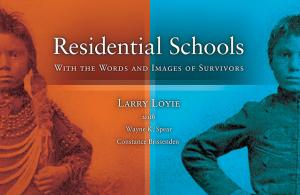
Residential Schools, with the Words and Images of Survivors
Residential Schools is a must-have book for Ontario schools and libraries. Award-winning author, Larry Loyie, provides an outstanding resource for sharing the truth of the residential school system. Writing from his personal experience attending St. Bernard Mission residential school in Alberta from the age of nine to 14, Loyie provides an important lens for the telling of these stories. The well-sequenced history of residential schools is shared through the lived experiences and stories of more than 70 former students from schools across the country. Loyie includes stories of First Nations, Métis and Inuit survivors and more than 125 images, including rare archival images. Students will appreciate the many photos and short biographical stories.
Loyie shares the truth of residential schools and this does include stories of abuse and death. These are told with a caring approach that is appropriate for a middle-school reader. Loyie and his team have written a much needed resource that supports the curriculum and teacher’s responsibilities set out in the calls to action of the Truth and Reconciliation Commission of Canada. We have a responsibility to teach the true history. Residential schools were used to erase culture and languages and assimilate the children who attended. Despite the odds, many survived and now inspire. The resistance and resilience of former students shines through in the stories! Especially those trying to help each other maintain their languages or escape the schools. The strength of Indigenous Peoples to work to bring back ceremonies and cultural practices is also evident in the book. Elder Bill Walkem (Nlaka’pamux) is just one example. Walkem is an 84-year-old residential school survivor who brought back an important tradition to his community after it had been banned. After 100 years people once again sang and circled together around the Nkw’i7tsu’tn (pronounced kwai-chutin) tree in central British Columbia. This book tells hard truths but it also leaves the reader with hope for the future. I wish to express my deepest gratitude to the former students for sharing their stories.
Julie Richer is a member of Upper Grand Teacher Local.